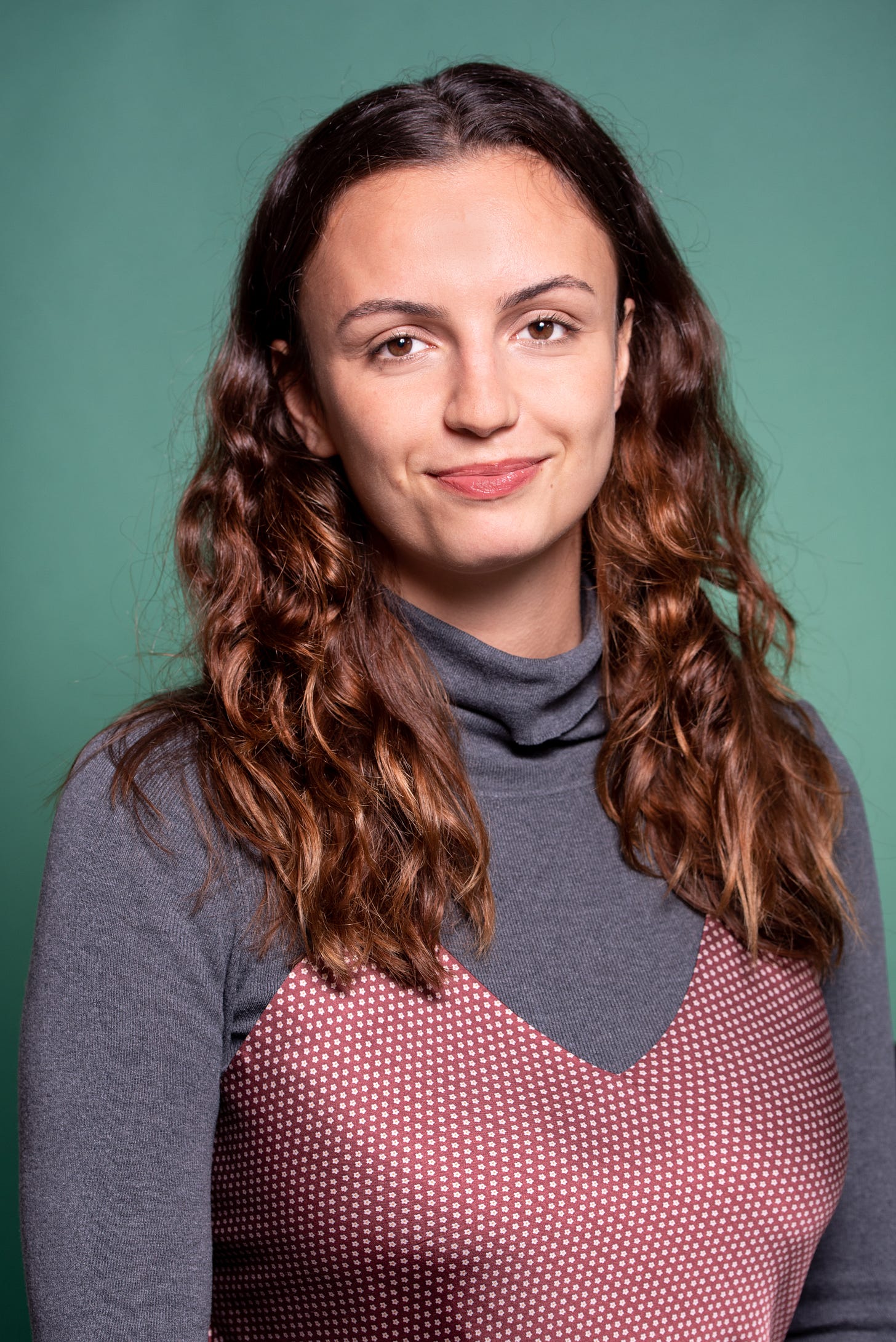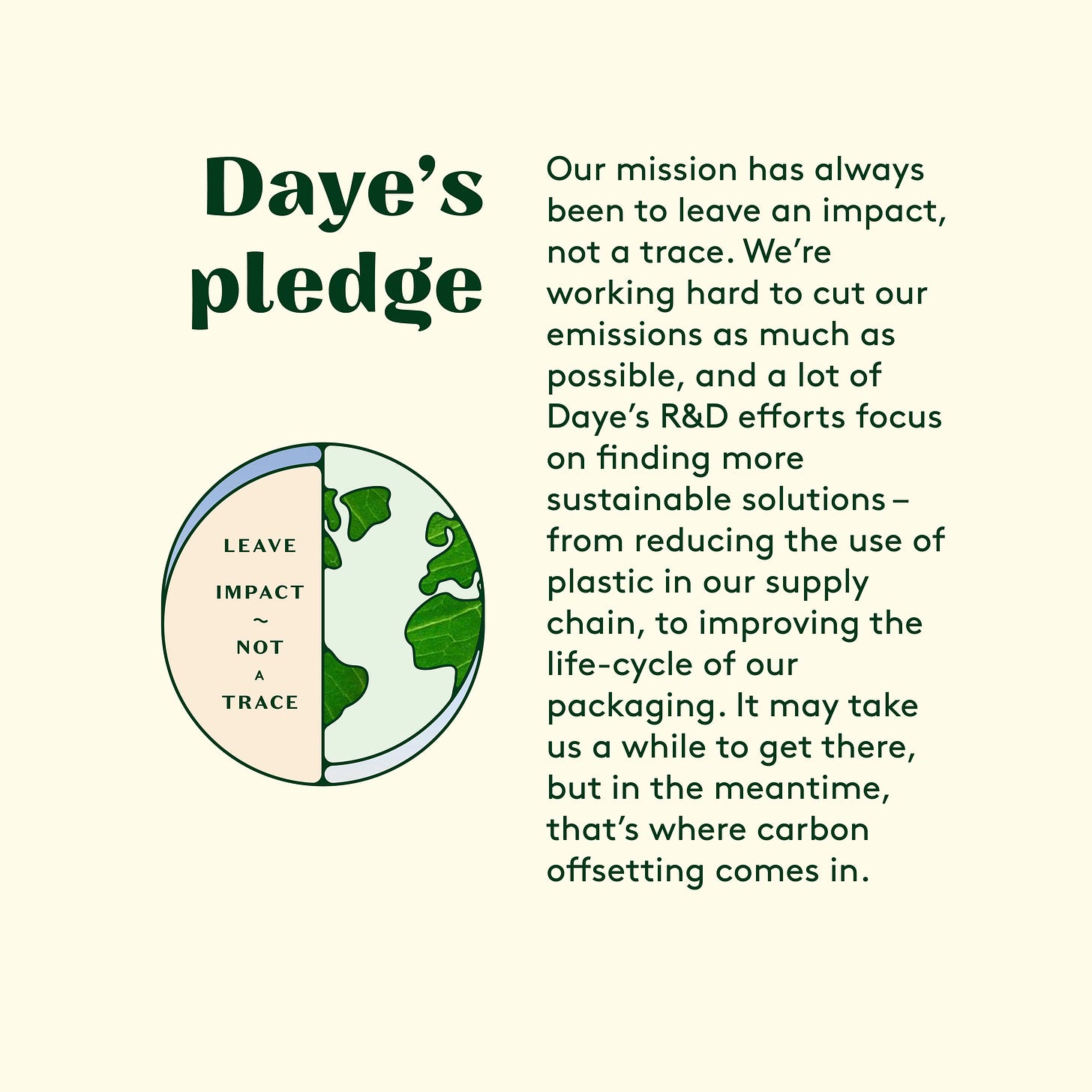💥 #4 - Meet the Brands: Daye's determined to leave an impact, not a trace.
Featuring Valentina Milanova, Founder of Daye.
We’ve been incredibly lucky to catch up with Valentina Milanova, Founder and CEO of Daye. Daye is a carbon neutral UK based womxn’s health and development start-up focused on bridging the “gender pain gap” through sustainable, CBD infused tampons. Daye’s tampons are made from sustainably sourced, plastic-free cotton fibres, and their bio-based tampon applicators are made of sugarcane. Their packaging is eco-friendly too, as it's either water-soluble, compostable, or biodegradable.
Daye is committed to ‘radical transparency’ both in its medical research, which can be found on their blog Vitals, and through ‘lifting the veil’ on their supply chains and processes and inviting their customers to know exactly what goes into creating their products. They’re on a mission to ‘leave an impact, not a trace’.
“You shouldn't be starting a consumer goods business without sustainability at the core of what you're doing...the world doesn’t need another company that mindlessly creates waste and pollution”
👉 So, what’s Daye’s mission when it comes to sustainability?
Daye interprets its sustainability vision as an ongoing impact mission. The focus within the business is on everyday milestones to get greener. The key to larger impact is a continuous sustainability journey and at Daye, leveraging material science innovation has been key to bringing a business to life that leaves an impact, rather than a trace. Daye is empowering consumers to make sustainable choices with confidence and ease as it’s hard for consumers to truly know the products they’re buying are really, truly and honestly sustainable.
Daye wants consumers to know that they are making the right purchasing choices when it comes to their menstruation products - without the need to Google search, or the need to go all out and get a degree in Ecology. We vouch to remove the burden of needing to become material science innovators and sustainability experts from consumers. With Daye, consumers should trust they’re making the right decision for the planet.
👉 How has Daye focused on reducing its footprint?
At Daye, sustainability is at the heart of everything we do. One element of this philosophy is that we operate a carbon neutral, zero waste organisation as a whole.
Daye manages its sustainability efforts through the framework of an Environmental Management System as well as a case by case basis when it comes to making choices relative to sustainability. The focus is on material science innovation, becoming zero waste and maintaining our carbon neutrality status.
How have you focused on these areas?
We use Material Science to reduce waste. We switched to water-soluble wrappers and compostable applicators for our tampons this year. The main focus here was to provide a greener product without compromising the user experience of Daye consumers.
Switching materials to lower our water footprint. To reduce the water footprint of our product, we switched from organic cotton to hemp fibre. The switch allowed a reduction in water consumption during the growing and processing of the materials for Daye’s tampons.
👉 How do you measure your impact, and then maintain carbon neutrality?
We mostly collect data on carbon and water usage. Our key stages are:
Using GET ENSIGHT to understand the footprint of our super tampon.
Using Pachama, a carbon offsetting company who can help offset your unavoidable emissions. We calculate the overall footprint of marketing events, team activities, supply chain, production and operations, which we then offset via Pachama’s carbon credits scheme. This helps us maintain carbon neutrality.
We work directly with our suppliers to get data on water usage.
As a team we collect this sort of information once every 6 months, or when big supply chain changes occur.
ENSIGHT’s INSIGHT: You can integrate your accounting software for a hands-off approach when it comes to real-time offsetting.
👉 As a SME, what do you do if your suppliers aren’t replying?
Persistence is key! Follow up, try and find another contact and keep asking. You’ll get there eventually. You can also try and rely on well-cited research papers to fill in your knowledge gaps.
👉 Are you working with any other partners? If so, how have they helped?
We’ve partnered with Liverpool University to accelerate their material science innovation. Universities are a great way to engage with students in different fields and collaborate on projects. With summer research projects, class workshops and thesis’, students have loads of research opportunities and rather than have their project pick up dust at the back of their professor’s office, they can have the guarantee their research will be put to action by collaborating with your business.
We’ve also made sure to use suppliers which are providing more environmentally friendly materials. For example, Fox Pack makes home compostable pouches you can use to store products for shipping to customers. Also, Smart solve! They produce water-soluble packaging which take, for example, 30 seconds to dissolve completely in water, which is incredible.
Another great example of a good, affordable partner is The First Mile, a waste management organisation. We used First Mile to recycle and reuse any waste we made during our production and workspace operations. This has been an ongoing partnership for 3 years now.
How much does this cost you?
Never more than £1000 a month, which is great value.
👉 How did you build your sustainability strategy into your budget? Any advice?
If you don’t have sustainability goals or commitments written down then you will have no budget now, and likely no budget later either. Set your goals and your mission today, otherwise, you'll never justify having the funds for it.
For us it's simple. Data today shows consumers are deeply interested in sustainability, and that it’s at the core of purchasing decisions for Gen Z and the consumer groups we are targeting. Being a sustainable brand makes us a more attractive purchase, which makes spending money on sustainability not only the right thing to do - but a great business decision.
If your stakeholders are reluctant for you to build it into the budget, then I recommend making it clear why consumers would want sustainability as a core part of your business. There’s loads of research out there saying consumers are shifting towards greener purchasing decisions.
👉 Did you see a return on investment when it came to your sustainability strategy?
We have a really fresh example of sustainability return on investment from only last month. After posting a video of our water-soluble Smart Solve wrapper on TikTok, it went viral with:
1 million views
3000 likes
3000 comments
👉 How have you engaged the Daye community along the way?
Consumers today are extremely knowledgeable about sustainability topics, so we don’t dumb sustainability information down. We bring up important topics and talk about impact openly and without oversimplifying. This is really important.
It’s also crucial to hire individuals with an existing interest in sustainability. The Daye team is passionate and really know their stuff, which is great.
👉 What’s next for Daye? Any exciting future developments?
We’re currently building an internal database on sustainable materials relative to our packaging and tampons. We’re happy to share this once it’s done - so keep your eye out!
💥 Impact Resources 💥
More about Environmental Management Systems and how you can use them.
Pachama - who help us offset what we can’t reduce
Fox Pack for home compostable pouches, or Smart Solve for water soluble packaging - depending on your packaging needs!
The First Mile - a great waste management organisation based in the UK.
Read more about Daye’s sustainability mission on Vitals.
What next?
Keep up with Daye on Instagram, LinkedIn, Twitter or Facebook.
Read more about Daye’s Carbon Neutral status here.
Check out their website here!






